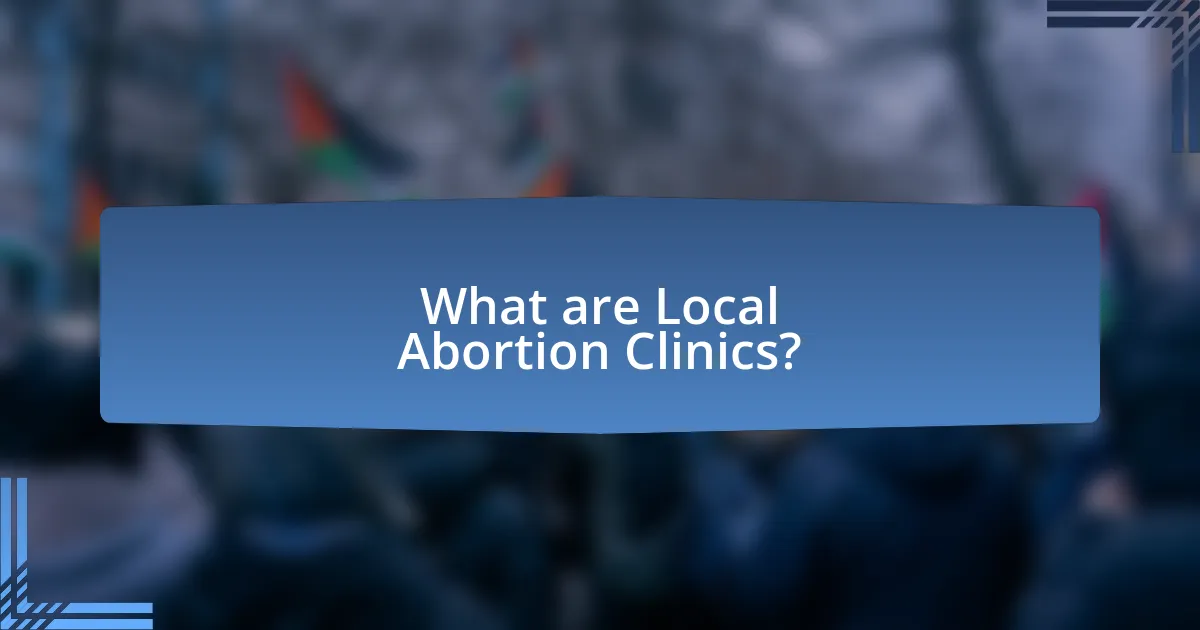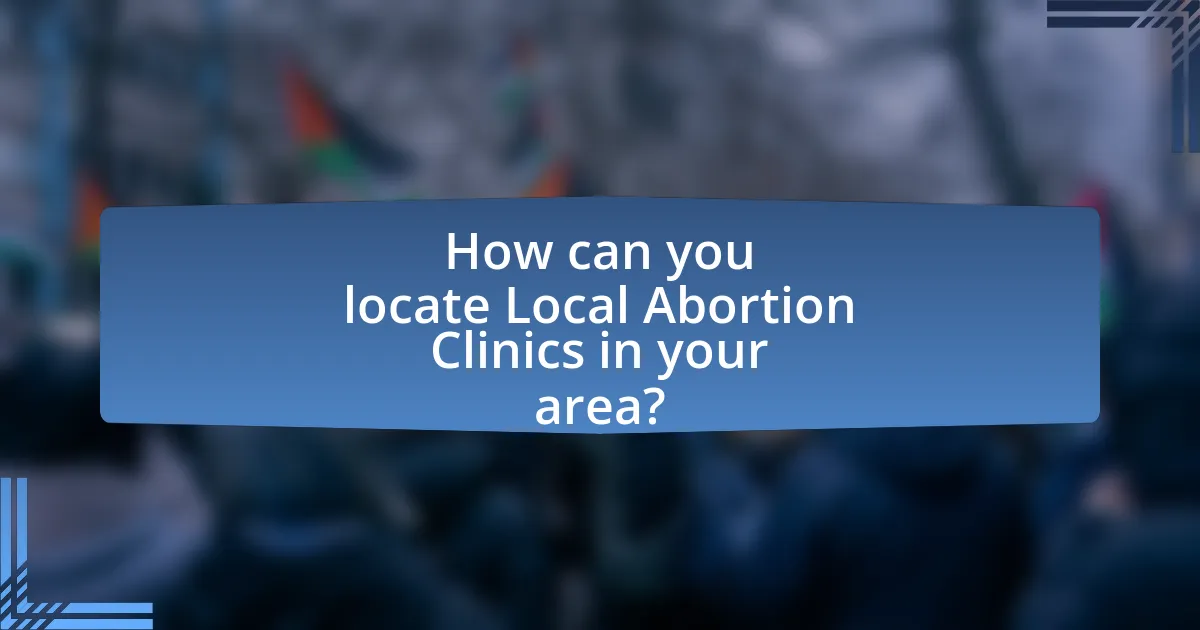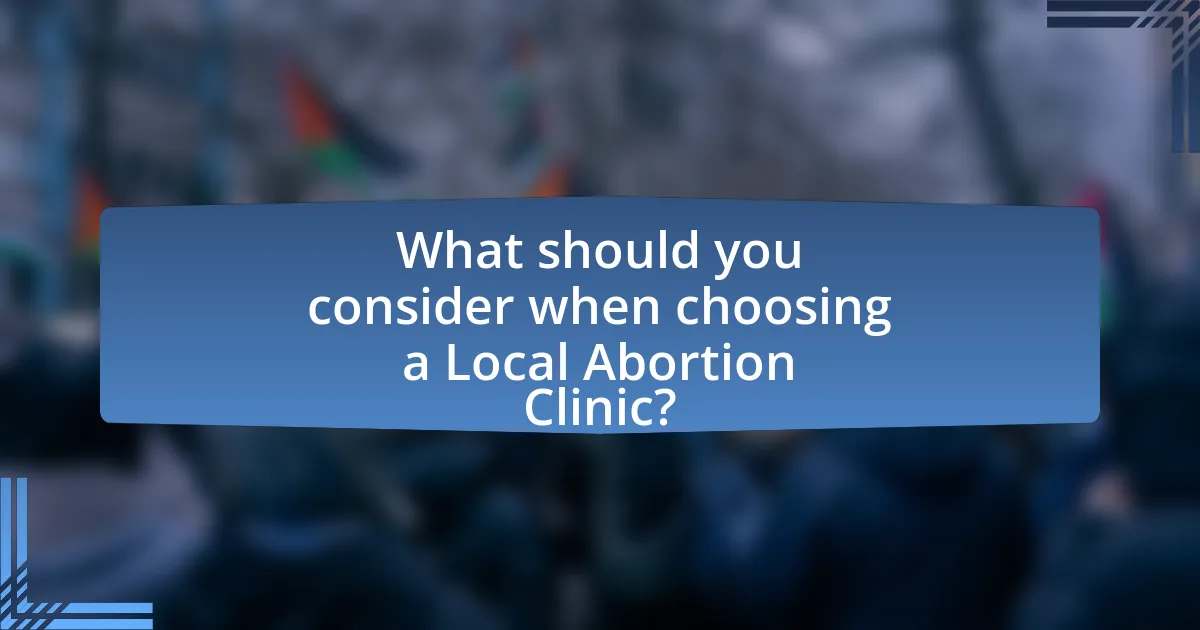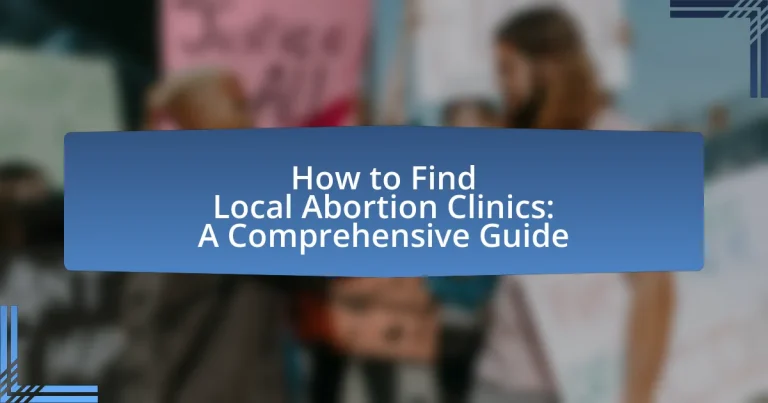Local abortion clinics are specialized healthcare facilities that provide abortion services, including medical and surgical procedures, along with additional reproductive health services such as counseling and contraception. This article offers a comprehensive guide on how to locate these clinics, detailing the differences between local abortion clinics and general healthcare facilities, the types of abortion procedures available, and the importance of choosing specialized care. It also outlines practical steps for finding clinics, evaluating their quality, and preparing for appointments, while addressing common concerns and misconceptions about abortion services.

What are Local Abortion Clinics?
Local abortion clinics are healthcare facilities that provide services related to abortion, including medical and surgical procedures for terminating pregnancies. These clinics often offer additional reproductive health services, such as counseling, contraception, and STI testing. According to the Guttmacher Institute, as of 2021, there were approximately 800 abortion clinics in the United States, highlighting their role in providing accessible reproductive healthcare.
How do Local Abortion Clinics differ from other healthcare facilities?
Local abortion clinics differ from other healthcare facilities primarily in their specialized focus on reproductive health services, particularly abortion procedures. Unlike general healthcare facilities, which provide a wide range of medical services, local abortion clinics are dedicated to offering safe and legal abortion options, often accompanied by counseling and support services tailored to the needs of individuals seeking these procedures. According to the Guttmacher Institute, as of 2021, there are approximately 800 abortion clinics in the United States, emphasizing their role as specialized providers in a landscape where many hospitals may limit or not offer abortion services due to various factors, including institutional policies or state laws. This specialization allows local abortion clinics to create an environment that is often more supportive and less stigmatizing for patients seeking reproductive health care.
What services do Local Abortion Clinics typically offer?
Local abortion clinics typically offer a range of services including medication abortions, in-clinic surgical abortions, pre-abortion counseling, post-abortion care, and contraceptive services. These clinics provide medication abortions, which involve taking pills to terminate a pregnancy, and surgical abortions, which may include aspiration or dilation and curettage procedures. Additionally, they offer counseling to help patients understand their options and provide follow-up care to ensure physical and emotional well-being after the procedure. Many clinics also provide contraceptive services to help prevent future unintended pregnancies.
Why is it important to choose a specialized clinic for abortion services?
Choosing a specialized clinic for abortion services is crucial because these clinics provide tailored care that addresses the specific medical, emotional, and legal needs associated with abortion procedures. Specialized clinics are staffed by trained professionals who have expertise in reproductive health, ensuring that patients receive accurate information, safe procedures, and appropriate follow-up care. Research indicates that patients who seek care from specialized facilities experience lower complication rates and higher satisfaction levels compared to those who use general healthcare providers. For instance, a study published in the American Journal of Public Health found that specialized clinics have protocols in place that enhance patient safety and comfort, which is vital for such sensitive healthcare services.
What types of abortion procedures are available at Local Abortion Clinics?
Local abortion clinics typically offer two main types of abortion procedures: medication abortion and in-clinic abortion. Medication abortion, also known as the abortion pill, involves taking two different medications to terminate a pregnancy, usually within the first 10 weeks. In-clinic abortion procedures include suction aspiration (also called suction curettage) and dilation and evacuation (D&E), which are performed by a healthcare provider and can be done in the first or second trimester. According to the Guttmacher Institute, over 99% of abortions in the United States are performed in the first trimester, highlighting the prevalence of these procedures at local clinics.
What are the differences between medical and surgical abortions?
Medical abortions involve the use of medication to terminate a pregnancy, while surgical abortions involve a medical procedure to physically remove the pregnancy from the uterus. Medical abortions typically use a combination of mifepristone and misoprostol, which can be taken up to 10 weeks into the pregnancy, and are often completed at home. In contrast, surgical abortions can be performed through various methods, such as suction aspiration or dilation and curettage, and are usually conducted in a clinical setting. According to the World Health Organization, both methods are safe and effective, but the choice between them may depend on factors such as gestational age, personal preference, and medical history.
How do clinics determine the appropriate procedure for each patient?
Clinics determine the appropriate procedure for each patient through a comprehensive assessment that includes medical history, current health status, and specific needs. This evaluation typically involves consultations where healthcare professionals gather information about the patient’s reproductive health, any previous procedures, and personal preferences. Evidence-based guidelines and protocols, such as those from the American College of Obstetricians and Gynecologists, inform the decision-making process, ensuring that the selected procedure aligns with the patient’s medical condition and safety requirements.

How can you locate Local Abortion Clinics in your area?
To locate local abortion clinics in your area, you can use online resources such as the Planned Parenthood website, which provides a clinic locator tool that allows users to find nearby facilities based on their zip code. Additionally, the National Abortion Federation offers a similar service to help individuals identify accredited clinics. These resources are reliable as they are maintained by reputable organizations dedicated to reproductive health services.
What online resources can help you find Local Abortion Clinics?
Online resources that can help you find local abortion clinics include the Planned Parenthood website, which provides a comprehensive directory of clinics based on location, and the Abortion Care Network, which offers a searchable database of independent abortion providers. Additionally, the National Abortion Federation’s website features a clinic locator tool that allows users to find accredited facilities. These resources are validated by their established presence in reproductive health services and their commitment to providing accurate information about available clinics.
How do search engines and health websites provide clinic information?
Search engines and health websites provide clinic information by aggregating data from various sources, including official health department listings, user-generated content, and clinic websites. Search engines utilize algorithms to index and rank this information based on relevance and accuracy, ensuring that users receive the most pertinent results when searching for clinics. Health websites often collaborate with healthcare providers and organizations to verify clinic details, such as services offered, hours of operation, and contact information, enhancing the reliability of the information presented. For instance, platforms like Healthgrades and Zocdoc compile user reviews and ratings alongside verified clinic data, allowing users to make informed decisions based on both qualitative and quantitative metrics.
What role do social media and community forums play in finding clinics?
Social media and community forums serve as vital resources for locating clinics, particularly for sensitive services like abortion. These platforms facilitate the sharing of personal experiences, recommendations, and reviews from individuals who have accessed local clinics, thereby providing firsthand insights into the quality of care and services offered. For instance, a study published in the Journal of Medical Internet Research found that 70% of users reported finding healthcare providers through social media interactions, highlighting the effectiveness of these platforms in disseminating information. Additionally, community forums often host discussions that can guide individuals in navigating local healthcare options, making them essential tools for those seeking clinic information.
What local organizations can assist in finding abortion services?
Local organizations that can assist in finding abortion services include Planned Parenthood, the National Abortion Federation, and local reproductive health clinics. Planned Parenthood operates numerous health centers across the United States, providing a range of reproductive health services, including abortion referrals. The National Abortion Federation offers a directory of accredited abortion providers and can connect individuals with local services. Additionally, local reproductive health clinics often provide information on available abortion services and can assist with scheduling appointments. These organizations are recognized for their commitment to reproductive health and have established networks to support individuals seeking abortion services.
How can reproductive health organizations provide support?
Reproductive health organizations can provide support by offering access to comprehensive reproductive health services, including abortion care, contraception, and counseling. These organizations often operate clinics that provide safe and legal abortion procedures, ensuring that individuals have the necessary medical care and support throughout the process. Additionally, they may offer educational resources about reproductive rights and health options, helping individuals make informed decisions. According to the Guttmacher Institute, access to such services is crucial, as it significantly impacts individuals’ health outcomes and autonomy.
What are the benefits of contacting local advocacy groups?
Contacting local advocacy groups provides essential support and resources for individuals seeking abortion services. These groups often offer information about available clinics, legal rights, and financial assistance, which can significantly ease the process of accessing care. For instance, organizations like Planned Parenthood and NARAL Pro-Choice America have established networks that connect individuals with local providers and can help navigate state-specific regulations. Additionally, advocacy groups frequently engage in community outreach and education, empowering individuals with knowledge about their reproductive health options. This access to tailored information and support can lead to more informed decisions and improved health outcomes.

What should you consider when choosing a Local Abortion Clinic?
When choosing a local abortion clinic, consider the clinic’s accreditation and licensing, as these ensure compliance with health and safety standards. Accredited clinics are typically subject to regular inspections and must meet specific medical guidelines, which can be verified through state health department resources. Additionally, evaluate the clinic’s reputation by researching patient reviews and testimonials, as well as the qualifications and experience of the medical staff. Access to counseling services and post-abortion care is also crucial, as these resources support emotional and physical well-being. Lastly, consider the clinic’s location and accessibility, including transportation options and operating hours, to ensure convenience during a potentially stressful time.
How do you evaluate the quality of care at a Local Abortion Clinic?
To evaluate the quality of care at a local abortion clinic, one should assess several key factors including the clinic’s accreditation, the qualifications of the medical staff, patient reviews, and the range of services offered. Accreditation from recognized organizations, such as the National Abortion Federation, indicates adherence to safety and quality standards. Qualified medical staff, including licensed physicians and trained nurses, ensure competent care. Patient reviews, often found on healthcare rating websites, provide insights into the experiences of others, reflecting the clinic’s reputation. Additionally, a comprehensive range of services, including counseling and follow-up care, signifies a commitment to holistic patient care.
What factors contribute to a clinic’s reputation and trustworthiness?
A clinic’s reputation and trustworthiness are primarily influenced by the quality of care provided, patient reviews, and accreditation status. High-quality care is evidenced by successful patient outcomes and adherence to medical guidelines, which fosters trust among patients. Patient reviews, often found on platforms like Google or Healthgrades, reflect real experiences and can significantly impact public perception. Accreditation from recognized bodies, such as The Joint Commission, serves as a formal validation of a clinic’s adherence to established standards, further enhancing its credibility. Collectively, these factors create a reliable framework for assessing a clinic’s reputation and trustworthiness.
How can patient reviews and testimonials inform your decision?
Patient reviews and testimonials can significantly inform your decision by providing insights into the experiences of others who have utilized the services of a specific abortion clinic. These reviews often highlight the quality of care, the professionalism of the staff, and the overall environment of the clinic, which can be crucial factors in making an informed choice. For instance, a study published in the Journal of Medical Internet Research found that 70% of patients rely on online reviews to assess healthcare providers, indicating the importance of shared experiences in decision-making. By analyzing both positive and negative feedback, potential patients can gauge the reliability and reputation of a clinic, ultimately leading to a more confident choice regarding their reproductive health care.
What questions should you ask when contacting a Local Abortion Clinic?
When contacting a local abortion clinic, you should ask about the types of services they offer, including medication and surgical options. Additionally, inquire about the costs associated with the procedures, whether they accept insurance, and what payment plans are available. It is also important to ask about the clinic’s licensing and accreditation to ensure it meets health and safety standards. Furthermore, you should confirm the availability of counseling services and aftercare support. Lastly, ask about the clinic’s policies regarding parental consent and waiting periods, as these can vary by location.
What information about costs and insurance should you inquire about?
Inquiring about costs and insurance for abortion services is essential to understand the financial implications. You should ask about the total cost of the procedure, including any additional fees for consultations, tests, or follow-up care. Additionally, inquire whether the clinic accepts your insurance and what specific services are covered under your plan, as coverage can vary significantly between providers. It is also important to ask about payment options, including sliding scale fees or financial assistance programs, to ensure affordability.
How can you assess the clinic’s approach to patient care and support?
To assess the clinic’s approach to patient care and support, evaluate their communication practices, staff qualifications, and patient feedback mechanisms. Effective communication includes clear information about services, procedures, and aftercare, which indicates a patient-centered approach. Staff qualifications, such as certifications and training in reproductive health, demonstrate the clinic’s commitment to providing safe and informed care. Additionally, reviewing patient testimonials and satisfaction surveys can provide insights into the quality of care and support offered, reflecting the clinic’s responsiveness to patient needs.
What are some common concerns and misconceptions about Local Abortion Clinics?
Common concerns and misconceptions about local abortion clinics include the belief that they are unsafe or unregulated. In reality, local abortion clinics are subject to strict health regulations and must adhere to safety standards set by medical authorities. For instance, the Guttmacher Institute reports that over 99% of abortions are performed safely, with complications being extremely rare. Another misconception is that local clinics do not provide comprehensive care; however, many clinics offer a range of services, including counseling and follow-up care, ensuring that patients receive holistic support. Additionally, some individuals mistakenly think that local clinics are only for low-income patients, but they serve a diverse clientele regardless of financial status.
How can understanding the facts help alleviate fears about abortion services?
Understanding the facts about abortion services can significantly alleviate fears by providing accurate information that counters misinformation and misconceptions. For instance, studies show that access to safe and legal abortion services is associated with lower rates of complications and improved mental health outcomes for individuals who choose to terminate a pregnancy. According to the World Health Organization, safe abortion procedures, when performed by qualified healthcare providers, have a very low risk of complications, which can help dispel fears surrounding safety. Furthermore, understanding the legal rights and available support services can empower individuals, making them feel more secure in their choices.
What resources are available for addressing emotional and psychological concerns?
Resources available for addressing emotional and psychological concerns include mental health hotlines, counseling services, support groups, and online therapy platforms. Mental health hotlines, such as the National Suicide Prevention Lifeline, provide immediate support and guidance. Counseling services, often available through community health centers, offer professional therapy for individuals facing emotional distress. Support groups, which can be found through organizations like the American Psychological Association, provide a space for individuals to share experiences and coping strategies. Online therapy platforms, such as BetterHelp and Talkspace, offer accessible mental health support through virtual sessions. These resources are essential for individuals seeking help with emotional and psychological issues, particularly in sensitive situations like those surrounding abortion.
What practical tips can help you prepare for a visit to a Local Abortion Clinic?
To prepare for a visit to a local abortion clinic, individuals should gather necessary documentation, understand the procedure, and plan for post-visit care. Collecting identification, insurance information, and any relevant medical history is essential for a smooth check-in process. Familiarizing oneself with the types of services offered and the specific procedures can alleviate anxiety and ensure informed decision-making. Additionally, arranging for transportation and support from a trusted friend or family member can provide emotional comfort and practical assistance during the visit.
How can you ensure you have all necessary documentation and information?
To ensure you have all necessary documentation and information, create a checklist of required documents such as identification, insurance cards, and medical records. This checklist should be based on the specific requirements of the local abortion clinic, which often includes verifying eligibility and understanding the procedure. Research the clinic’s website or contact them directly to confirm what documentation is needed, as requirements can vary by location and state regulations. Additionally, keeping a folder with all relevant documents organized will facilitate easy access and ensure nothing is overlooked.
What should you expect during your appointment at a Local Abortion Clinic?
During your appointment at a local abortion clinic, you should expect a series of steps designed to ensure your safety and comfort. Initially, you will undergo a consultation where medical staff will discuss your medical history, the procedure options available, and answer any questions you may have. Following this, you may receive an ultrasound to determine the gestational age of the pregnancy, which is crucial for deciding the appropriate method of abortion.
The clinic will also provide information on what to expect during and after the procedure, including potential side effects and aftercare instructions. It is common for clinics to offer emotional support services, as well as resources for contraception and follow-up care. These procedures are in line with established medical practices to ensure patient safety and informed consent.


